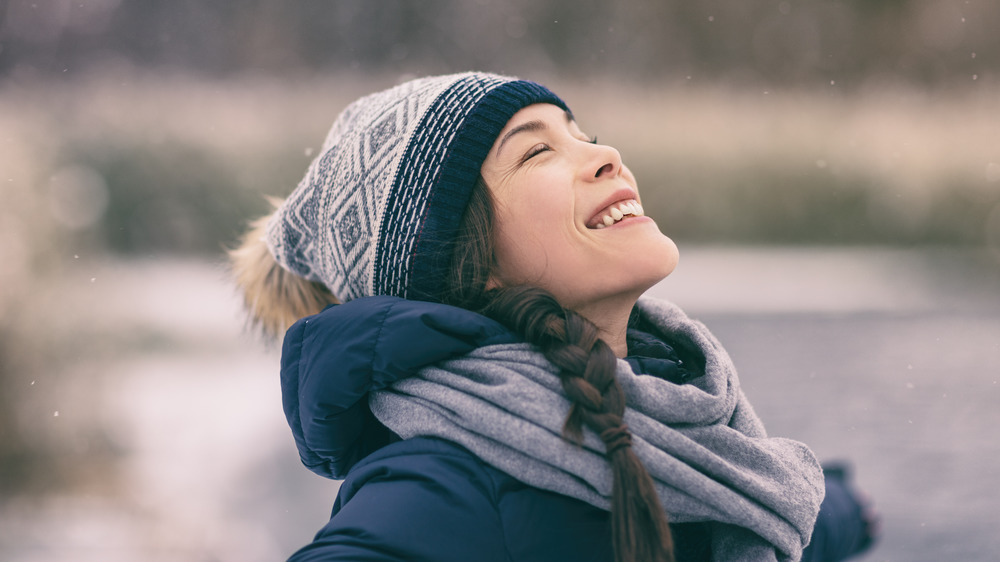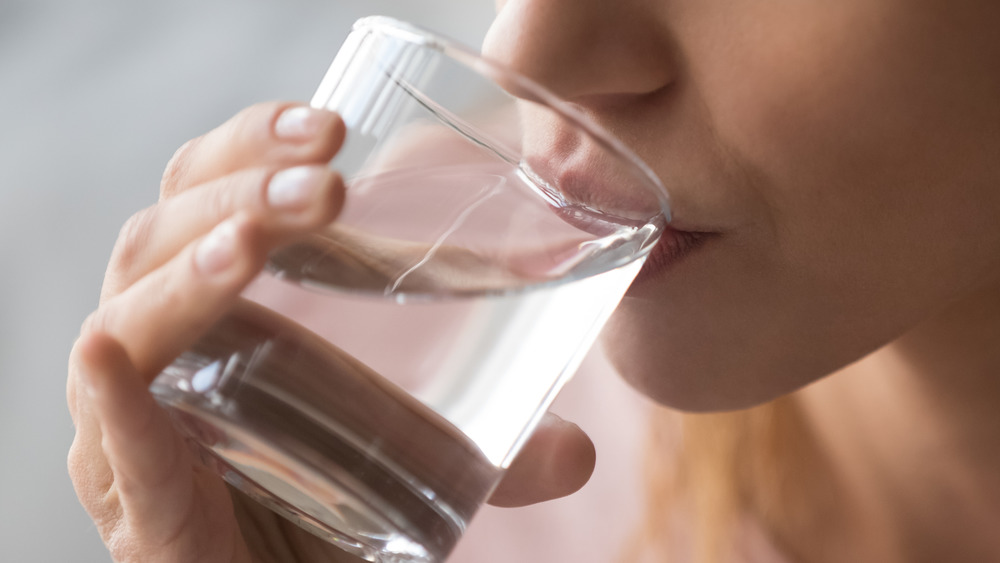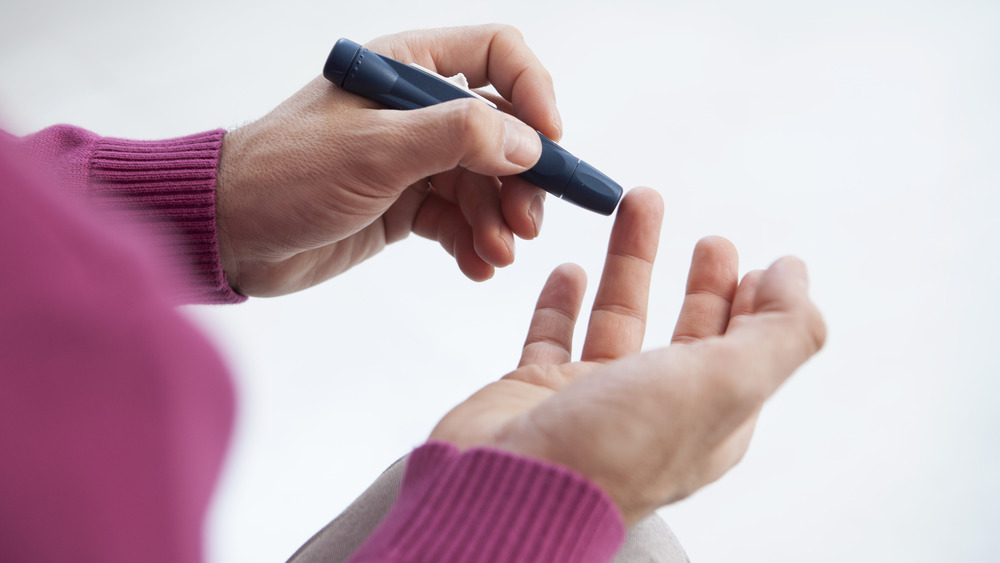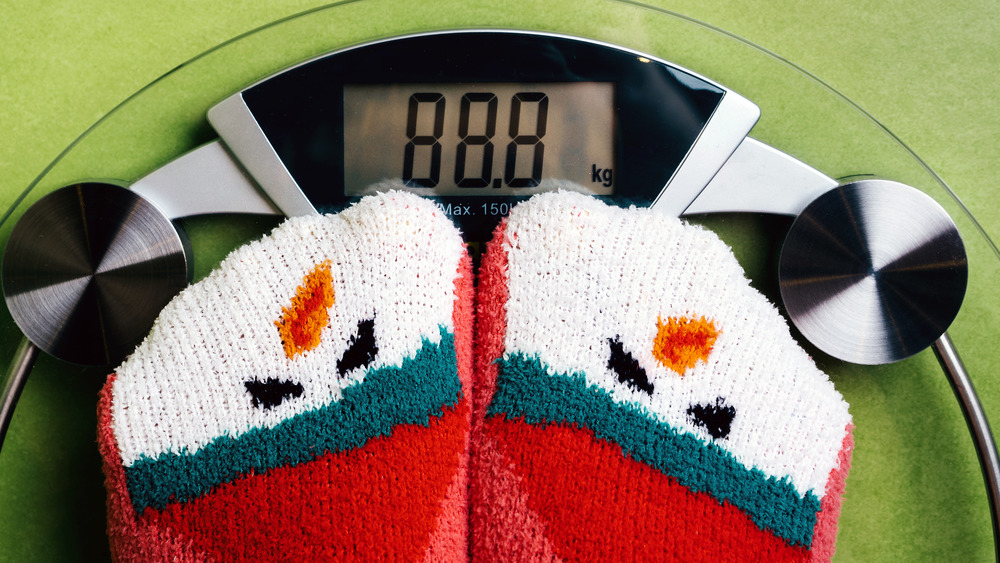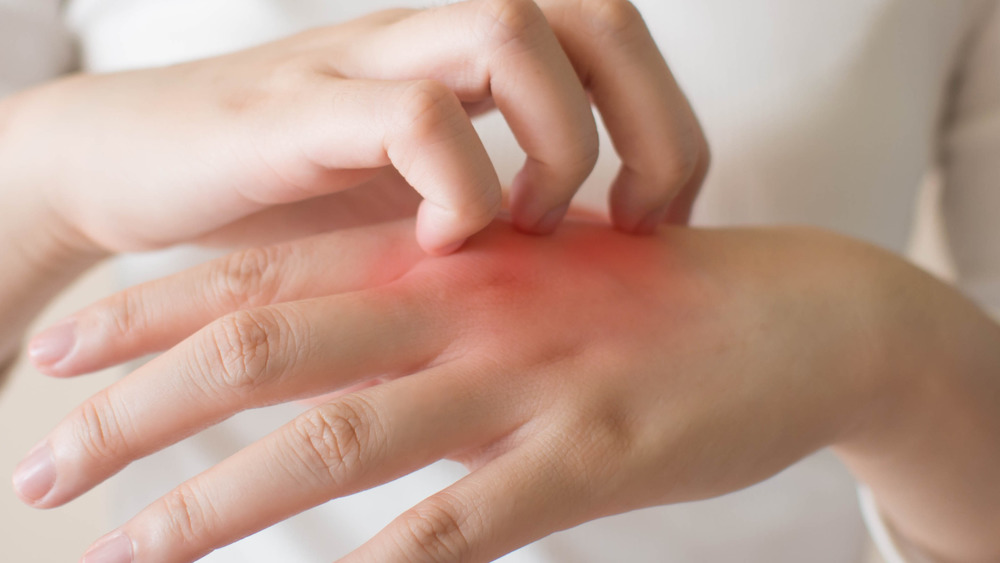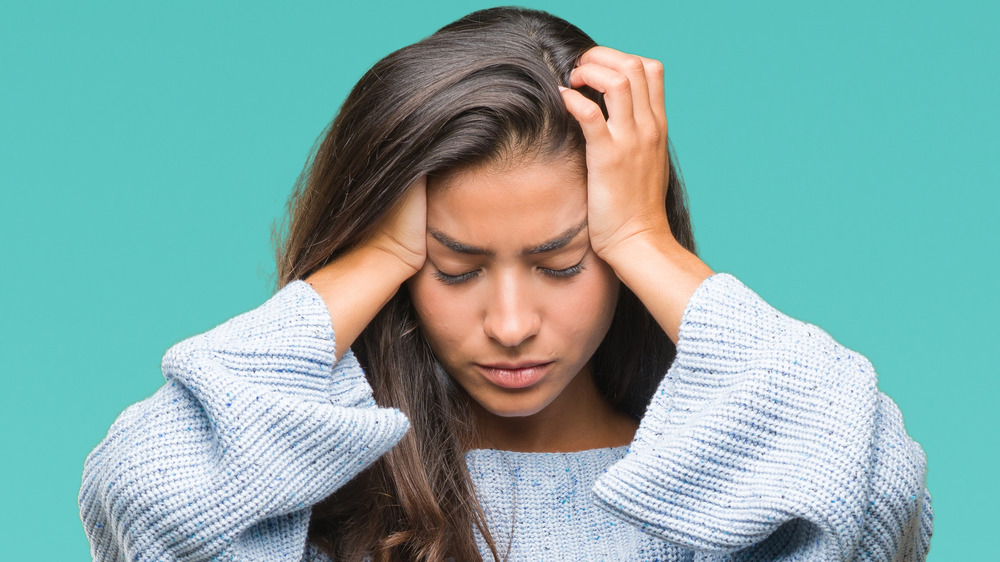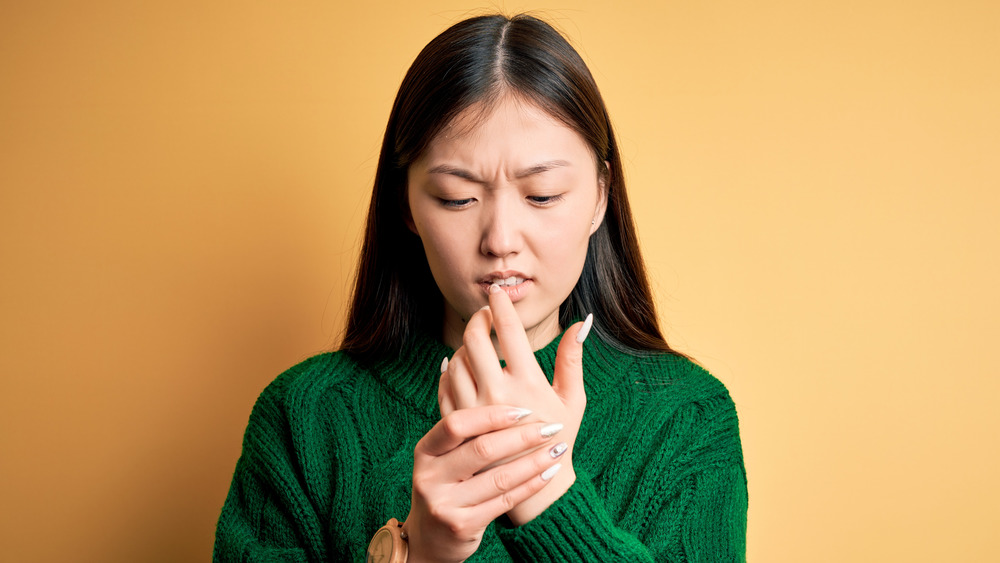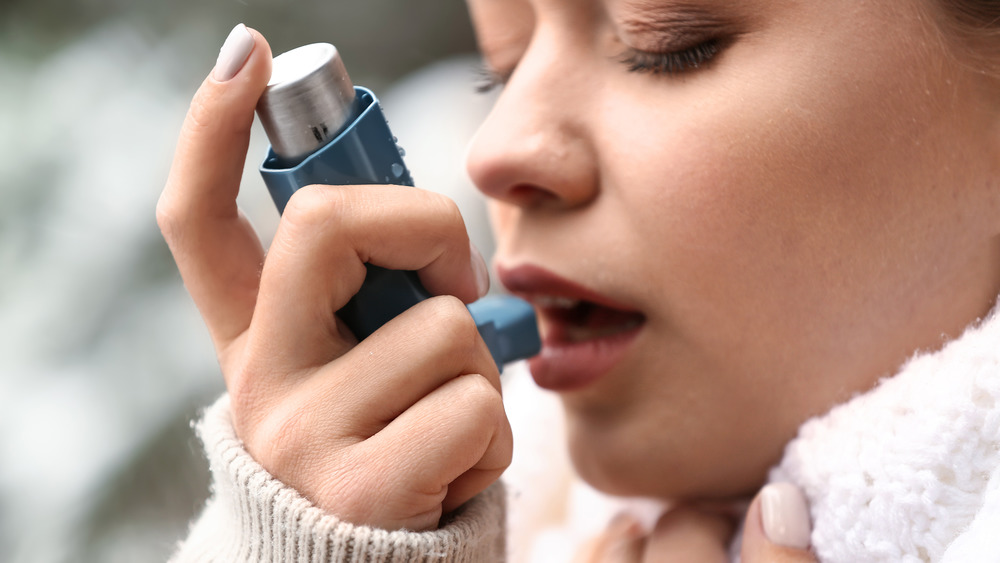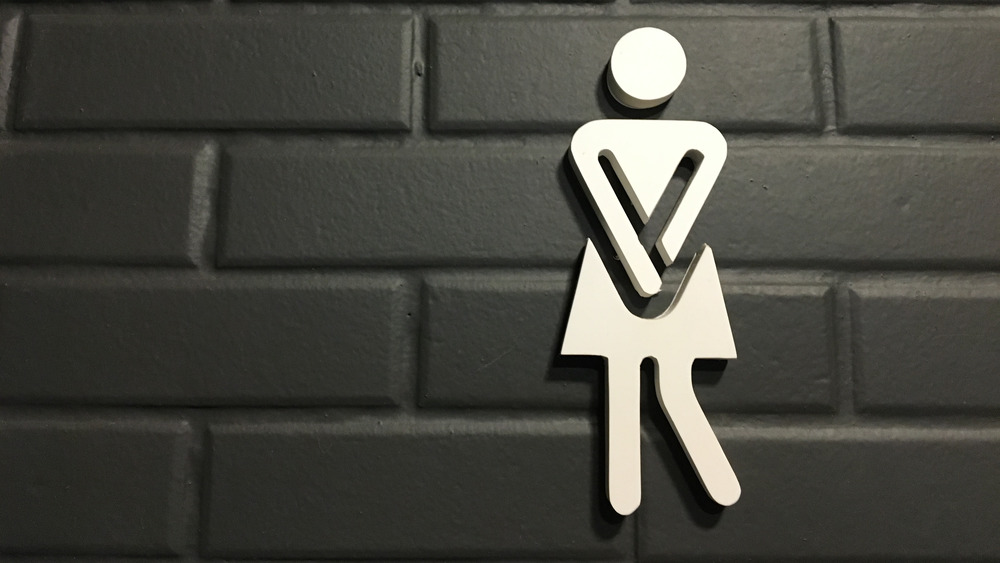Strange Things That Can Happen To Your Body In The Winter
Do you love the winter season? It's the time of year to get out the warm, bulky sweaters, drink hot cocoa by the fireplace, or go skiing. Shoveling snow isn't for the faint of heart, but watching it fall and turn the landscape into a winter wonderland can be one of the season's joys.
Alas, with the cold weather comes a host of ailments that are triggered by the dipping temps. In fact, there's a lot of strange things that can happen to your body during these chilly months. We sleep better because it's colder and darker for longer and, thankfully, our hay fever takes a break. We even think more clearly when the temperature plummets, a 2017 study published in Psychological Research found. Even just being shown images of colder temperatures improves cognition, so there's a trick for those of you in warmer climates. There's even stranger things that can happen to your body in the wintertime, though. Many of them will likely surprise you.
Dry mouth is a common malady in the winter
Winter dry mouth is a thing. It happens due to the lack of moisture in the air. To cope with colder, dryer temperatures, many people stay indoors where they have the heat going. That means it's awfully dry inside too. There's also the prevalence of colds during these chilly months, which means you'll probably be breathing through your mouth more — thus drying it out further, and a dry mouth means less saliva production. Saliva is important because it fights against decay and oral infections in your mouth, Mountain Aire Dentistry explained.
There is something you can do, however, to battle dry mouth. Simply drinking more water will help you stay hydrated and "fill the function of the decreased saliva production in your mouth," according to the dental practice. Avoiding things that can contribute to dry mouth will also help — things like sugary soft drinks, caffeinated beverages, alcohol, and tobacco products. Sugar-free chewing gum and candy can help boost saliva production. Mountain Aire Dentistry also recommended using a humidifier to combat dry air inside your home.
Your teeth might hurt in the wintertime
Do your teeth hurt when you have ice cream? If so, they probably also likely hurt when you go outside in the winter. That's because "cold weather increases pain sensitivity and intensity for some people," Silverado Family Dental revealed.
One reason for this may be that you have inadequate enamel, the protective outer coating, on your teeth. "If your enamel needs a boost to give it an edge against extreme temperatures, use a toothpaste designed for sensitive teeth before going outside," the dental practice suggested. You should also wait a half-hour or so after using the toothpaste before stepping out into the cold, and void eating or drinking anything during that period of time. Otherwise, it could make the toothpaste less effective.
Silverado Family Dental named other ways to protect your enamel, which include avoiding acidic foods and drinks as well as brushing and flossing daily. If you don't have sensitive teeth but feel intense pain when outside in the winter, this is a red flag. You might have an issue like inflamed sinuses, an ear infection, broken tooth, or a cavity.
In the winter, your blood sugar can rise
According to Healthline, more people are diagnosed with diabetes in the winter months. There's some evolutionary magic at work here. During prehistoric days, humans survived a dramatic temperature drop over the span of a few years. Dr. Sharon Moalem wrote a book about this topic and told Healthline that he thinks our ancestors' bodies slowed their output of insulin as a way to cope. They also had much more "brown fat," which is "a type of fat that generates heat as long as it has fuel," according to the publication. It doesn't need insulin, but most of us don't have a lot of this kind of fat anymore, and we're not used to the cold like our ancestors were.
Interestingly, people who already have diabetes may need more insulin in the winter, and less when the weather warms up. "Cold weather seems to play a bigger role in our diabetes management than we might think," Healthline explained.
Winter weight gain is a thing
When it's cold out, we feel like eating more. Shorter daylight hours can be to blame. Dr. Perry Barrett, senior research fellow at the University of Aberdeen, told the Daily Mail that levels of melatonin, a "hormone [that] acts on appetite," increases in autumn and winter. Additionally, our diet tends to change in the colder months. "In winter, we go for energy-dense, calorific foods, which tend to be sweeter or fattier," Dr. Barrett said.
Low levels of vitamin D, a vitamin we get from sunlight, is also a factor in wintertime weight gain. A 2017 study in Nature found that lack of sunlight can increase fat cells' ability to store fat. Additionally, "we fear starvation more than we fear gaining too much weight, so the desire to keep eating is a stronger motivating factor," CBC Wellness explained, citing the results of a 2016 study. Because food tends to be more scarce during the winter months, "we're more susceptible to our evolutionary urges," the report continued.
To help fight these behaviors, Men's Journal suggested avoiding white flour products and limiting sugar, as well as filling up on fiber-rich foods and protein.
You can burn more calories in the winter
If you find yourself shivering in the winter months, know that your body is actually burning more calories than it could if you were warm. Cold temperatures can also activate the body's stores of brown fat, or the good kind of fat that burns calories, reported Shape. But don't get too excited. As Vox reported, "These processes only kick in to keep you warm when you're truly cold. But once you start exercising outside, you're going to start generating heat from the physical activity. And the exercise alone may give you enough heat that your body wouldn't burn any extra calories through shivering and brown fat."
Dr. Herman Pontzer, who studies energetics, told Vox that the best way to use the cold to burn more calories would be to not exercise while outdoors. "You'd get your brown fat cooking and making heat, and might even start shivering, all of which burns calories," he said. As Vox reminded its readers, physical activity only makes up a small part of total energy burn. But anything helps, right?
The winter dries out your skin
You've probably noticed that your skin — particularly your hands — get drier during the winter. They can get scaly, red, and raw. And when skin is dry, it can itch, so there's that too. It's all attributed to the lack of moisture in the air. As Harvard Women's Health Watch explained, winter has low humidity and indoor heat has drying effects. The combination can make skin uncomfortable.
Skin moisturizers are the first step in treating this condition. "The thicker and greasier a moisturizer, the more effective it will be," Health Water revealed. Some of the most effective and least expensive options cited are petroleum jelly and moisturizing oils like mineral oil. Other ways to fight dry skin include using a humidifier set to around 60 percent, limiting yourself to quick daily showers with lukewarm water, and applying moisturizer right away after bathing or washing hands. And, most importantly, "never, ever scratch," cautioned the publication.
The winter can make you more prone to migraines
While the winter weather can make you more prone to migraines, this applies to people who already get migraines. Yes, weather changes can be a trigger for migrainers. The American Migraine Foundation described winter as being a period of cold temperatures, dry air, and snowstorms. Cynthia Armand, a physician at the Montefiore Medical Center in New York, told the foundation that these cold, dry conditions combined with warm indoor temperatures can lead to dehydration. Additionally, snowstorms and the changing of fall into winter and winter into spring can mean barometric pressure changes — yet another trigger.
A 2015 study in The Journal of Headache and Pain confirmed that temperature is a trigger. As the study concluded, "This diary-based study provides evidence to link the perception of temperature sensitivity and headache incidence in migraine patients. Those who reported temperature sensitivity are more likely to have headache increase during the winter, particular for mild headaches."
Whatever you're doing to prevent migraines should also be effective against seasonal triggers, according to the American Migraine Foundation. In the winter, particularly, up your water intake, plug in that humidifier, and seal any drafty areas in your home to avoid temperature fluctuation indoors.
Muscles tend to tighten up in the winter
Physical therapist Linda Scholl told the University of Utah Health, "The less we're moving or the colder it gets, the more tense we tend to be." She continued, saying, "If we're sitting, for instance, at the computer all day and the cold air has been on, chances are our shoulders have been kind of creeping up and we've kind of been tensing our whole body up just because we're cold, sore, tired, and stiff." Scholl recommended relaxing your shoulders and moving your body more. If you're on the computer a lot, make sure to give yourself breaks.
Whatever you do, start off gently. Scholl said to picture lengthening your whole body, pretending someone's pulling a string on the top of your head, "pulling your body up, getting your shoulders down, lengthening your back, pulling your belly muscles in, squeezing your shoulder blades a little bit together to try and maintain better posture." Improve your posture, do some shoulder rolls, and just generally stay active to avoid this all-over muscle stiffness.
The winter can also make arthritis act up
During the brisk winter months, people with arthritis or rheumatoid arthritis may have more painful and stiffer joints than usual. "The experience of pain may also worsen in the cold due to an emotional response to lower temperatures and shorter daylight hours," Healthgrades explained. "The winter season can increase depression and feelings of isolation, which in turn may intensify the perception of pain and discomfort from RA [rheumatoid arthritis] symptoms."
Everyday Health provided some tips on finding relief from arthritis pain during the winter, like dressing in warm layers, hydrating, losing weight, exercising inside, supplementing with vitamin D, taking fish oil supplements, getting a massage, and most importantly, staying safe. This means wearing the right kind of shoes and avoiding dangerous surfaces if you go outside. Healthgrades also advised keeping heat packs in your pockets to keep hands warm when outdoors, and using heating pads on sore joints once you come back inside.
Watch out for snow blindness in the winter
Have you ever stepped outside after a fresh snowfall only to have to shield your eyes from the intense sunlight? Even looking at the snow could cause your eyes to hurt. There's an extreme version of this phenomenon called photokeratitis, defined by the American Academy of Ophthalmology as a painful eye condition caused by ultraviolet (UV) rays from the sun or other sources. It's essentially like having a sunburn, but on your eyes.
Snow blindness is one form of photokeratitis, and is caused by UV rays reflected off ice and snow. According to the American Academy of Ophthalmology, snow blindness may also refer to "freezing of the cornea's surface, as well as severe drying of the corneal surface due to extremely dry air. Skiing, snowmobiling, and mountain climbing are activities commonly associated with this condition."
Unfortunately, the condition is usually not noticed until there's already damage. The American Academy of Ophthalmology highlighted some common symptoms, including pain, redness, blurriness, tearing, a gritty feeling, swelling, sensitivity to bright light, and more. The good news is snow blindness usually goes away on its own, so treatment is all about comfort. To prevent this from happening in the first place, the American Academy of Ophthalmology recommends wearing eye protection that blocks UV radiation.
The winter can cause dry eyes
The lack of moisture in the air strikes again! Lower humidity, both indoors and out, create "warm, dry conditions where moisture can evaporate from the eye faster than normal," optometrist Marissa Locy said in a University of Alabama at Birmingham press release cited by WebMD. If you wear contacts or already have dry eye, your eyes can get even drier come winter. Dr. Locy said to always wear clean contacts, and suggested using a humidifier, drinking lots of fluids, protecting your eyes from extreme cold and wind, and not letting heat blow directly onto your face.
Using artificial tears at least twice a day as a preemptive measure can also help winter dry eye, Dr. Vatinee Bunya, co-director of the Penn Dry Eye & Ocular Surface Center, told Self. Since we tend to blink less when in front of a computer screen, periodic breaks are important. Dr. Bunya recommended the "20-20-20 rule." This means that for every 20 minutes you spend looking at a screen, you should spend at least 20 seconds looking at something at least 20 feet in the distance.
Your body can get more wrinkly in the winter
As the The Kit reported, a study conducted by Olay found that "the look of fine lines and wrinkles worsen when temperatures drop, [and] every passing winter actually makes us look older." In other words, the damage is permanent. Dr. Frauke Neuser, Olay's principal scientist, told The Kit that this can be avoided. Among her suggestions: moisturize, exfoliate thoroughly using a gentle product, and give your under-eye areas some extra attention by using eye cream. It's also important to remember that the sun can still cause damage to your skin in the winter. Apply a minimum of SPF 30 daily, as recommended by APDerm.
To prevent winter wrinkles, Yahoo! Style advised avoiding skincare products that can cause irritation, and instead look for oils, like olive, coconut, or aloe vera, or humectants like dimethicone, glycerine, vitamin E, and hyaluronic acid. When it comes moisturizers, stick with ones with ceramides, and avoid moisturizers with added fragrance and essential oils.
Your asthma may worsen in the winter
Wintertime isn't great for people with asthma. There are several reasons for this. The cold air is a common trigger, according to Allergy Partners, and asthmatics can be sensitive to sudden changes in temperature as well. For some, this is only aggravated during exercise as they "breathe more cold air through their mouths," Allergy Partners explained. "If possible, try to avoid the cold, but when unavoidable, cover your nose and mouth and try to breathe through your nose."
However, spending more time indoors can also make your asthma worse if you have indoor allergies to things like pets, dust mites, and mold. And then, of course, there's the fact that colds and the flu run rampant during the winter. "Infections can subsequently trigger asthma symptoms," said Allergy Partners. "Washing hands and avoiding sick contacts are essential for asthmatics."
The Cleveland Clinic said there are a few things you can do to stay healthy during the winter: Limit your outdoor exercise, get the flu vaccine, use a humidifier, and have an asthma plan in place with your doctor before wintertime.
You'll have to pee more in the winter
Have you noticed that you need to pee way more in the winter? There's a name for this: cold diuresis. Arkansas Urology described this condition as "the body's way of preserving heat when it feels that you may be in danger of hypothermia." The explanation is long but can be summed up thusly: Blood vessels constrict, causing an increase in blood pressure, which causes the kidneys to filter out excess fluid, which then has to go somewhere. You know, like into the toilet.
"Currently, there is no scientific research that can definitively tell us a set temperature, exposure length, age, or other factor that causes cold diuresis," Arkansas Urology stated. "Luckily, if you find yourself urinating more often in cold weather you can rest assured it probably isn't a sign of anything too serious." Just layer up and try to stay warm, and make sure to drink extra water when you come in from the cold.

